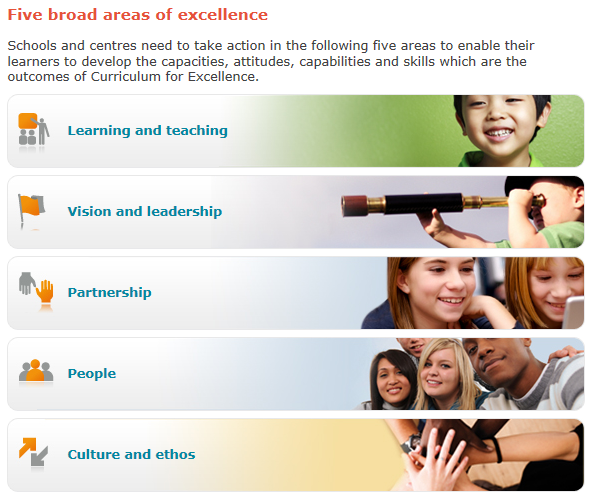The Sciences report discusses sharing practice. In our first face-to-face conversation day which took place on Monday 10th December, some participants discussed the value of reflecting on others’ practice, and highlighted the importance of Education Scotland’s role in sharing practice in the sciences and more broadly in terms of planning and leadership for example.
There are a number of routes through which Education Scotland shares practice, whether focused on sciences, or more broadly on Curriculum for Excellence, and learning and teaching.
One is the Journey to Excellence website. This is a professional development resource which describes the Journey to Excellence and its five  associated areas: learning and teaching, vision and leadership, partnerships, people and culture and ethos. Videos of thought-provoking and innovative practice from across Scotland are shared, along with a range of other resources for use in reflection, discussion and planning for transformational change. All films are also available through iTunes U. Other resources include:
associated areas: learning and teaching, vision and leadership, partnerships, people and culture and ethos. Videos of thought-provoking and innovative practice from across Scotland are shared, along with a range of other resources for use in reflection, discussion and planning for transformational change. All films are also available through iTunes U. Other resources include:
- learning together packs to support individual and collegiate working
- research summaries and extracts
- famous Scots describing what excellence means to them
- leading educational thinkers talking about key issues.
The site is searchable by key words (e.g. science). Further work associated with the Sciences 3-18 Impact report is currently underway and new videos will be available in early 2013.
Through a number of avenues, for example our e-mail news services “Today’s News”, our twitter feed and Facebook pages, we share news of excellence identified through our inspection programme; for example excellence in implementation of CfE at Calderglen High School in East Kilbride, announced yesterday.
 Education Scotland evalutes and shares evolving practice and this is reflected in the series of Curriculum for Excellence briefing papers, of which paper 6 (parts I and II) has been recently published. The series of Curiculum for Excellence briefing papers can be found on our website.
Education Scotland evalutes and shares evolving practice and this is reflected in the series of Curriculum for Excellence briefing papers, of which paper 6 (parts I and II) has been recently published. The series of Curiculum for Excellence briefing papers can be found on our website.
The Opening up the Future blog is also a route through which innovative practice associated with the use of the “promoting innovative practice and transformative change” tools is shared. This approach, which brings a “futures” perspective into the improvement planning cycle, and increases the likely success of innovative change projects, was used as the basis for our recent sciences conversation day.
The Sciences Curriculum Area Impact Project report included 34 examples of good practice, and we’ve been pleased to receive inquiries around these, and to be able to facilitate discussions between practitioners and schools as a result. These examples of good practice will be updated from time-to-time as we gather evidence of emerging innovative and through-provoking practice in sciences across Scotland. The Sciences 3-18 blog provides a route for discussions and sharing practice associated with the sciences. It’s public and anyone can comment; so please feel free to do so!
STEM Central in Motion is an outward facing public Glow blog set-up to provide a mechanism through which children and young people, practitioners, partners and the wider STEM community can share practice associated with learning and teaching in sciences, technologies, engineering and mathematics. The purpose of the blog is to help practitioners identify what works to improve outcomes for children and young people by sharing practice, and hearing from children and young people themselves.
a mechanism through which children and young people, practitioners, partners and the wider STEM community can share practice associated with learning and teaching in sciences, technologies, engineering and mathematics. The purpose of the blog is to help practitioners identify what works to improve outcomes for children and young people by sharing practice, and hearing from children and young people themselves.
Earlier this year we launched the STEM professional learning community (Glow log-in required), tying in with the work associated with taking forward Teaching Scotland’s Future.
This community provides you with the opportunity to connect with other educators with an interest in sciences, technologies, engineering or mathematics. You can tap into online learning opportunities, and keep up to date with STEM related professional learning opportunities available in Scotland, sharing practice with others in the community.
Community tools can help you to measure and track the impact of your professional learning on outcomes for learners. The community brings together relevant information from CPDFind the Education Scotland learning blog, the STEM Central in Motion blog and The Sciences 3-18 Curriculum Area Impact Project blog.
Are there ways of sharing practice which Education Scotland is not doing which would be helpful? Which of the current mechanisms do you find most useful? Do you use practice shared nationally as the basis for discussion in your department or faculty, or as a basis for reflection on your own practice?



